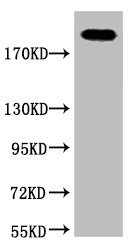![ELISA analysis of antigen using GTX60571 Fibronectin antibody [2F4G2].
Black : Control antigen 100ng
Purple : Antigen 10ng
Blue : Antigen 50ng
Red : Antigen 100ng ELISA analysis of antigen using GTX60571 Fibronectin antibody [2F4G2].
Black : Control antigen 100ng
Purple : Antigen 10ng
Blue : Antigen 50ng
Red : Antigen 100ng](https://www.genetex.com/upload/website/prouct_img/normal/GTX60571/GTX60571_20170912_ELISA_w_23061123_827.webp)
ELISA analysis of antigen using GTX60571 Fibronectin antibody [2F4G2].
Black : Control antigen 100ng
Purple : Antigen 10ng
Blue : Antigen 50ng
Red : Antigen 100ng
Fibronectin antibody [2F4G2]
GTX60571
ApplicationsFlow Cytometry, Western Blot, ELISA
Product group Antibodies
ReactivityHuman
TargetFN1
Overview
- SupplierGeneTex
- Product NameFibronectin antibody [2F4G2]
- Delivery Days Customer9
- Application Supplier NoteWB: 1/500 - 1/2000. FACS: 1/200 - 1/400. ELISA: 1/10000. *Optimal dilutions/concentrations should be determined by the researcher.Not tested in other applications.
- ApplicationsFlow Cytometry, Western Blot, ELISA
- CertificationResearch Use Only
- ClonalityMonoclonal
- Clone ID2F4G2
- Concentration1 mg/ml
- ConjugateUnconjugated
- Gene ID2335
- Target nameFN1
- Target descriptionfibronectin 1
- Target synonymsCIG, ED-B, FINC, FN, FNZ, GFND, GFND2, LETS, MSF, SMDCF, fibronectin, cold-insoluble globulin, epididymis secretory sperm binding protein, lnc-ABCA12-8, migration-stimulating factor
- HostMouse
- IsotypeIgG1
- Protein IDP02751
- Protein NameFibronectin
- Scientific DescriptionThis gene encodes fibronectin, a glycoprotein present in a soluble dimeric form in plasma, and in a dimeric or multimeric form at the cell surface and in extracellular matrix. Fibronectin is involved in cell adhesion and migration processes including embryogenesis, wound healing, blood coagulation, host defense, and metastasis. The gene has three regions subject to alternative splicing, with the potential to produce 20 different transcript variants. However, the full-length nature of some variants has not been determined. [provided by RefSeq, Jul 2008]
- ReactivityHuman
- Storage Instruction-20°C or -80°C,2°C to 8°C
- UNSPSC12352203

![FACS analysis of HeLa cells using GTX60571 Fibronectin antibody [2F4G2]. Green : Fibronectin Red : negative control FACS analysis of HeLa cells using GTX60571 Fibronectin antibody [2F4G2]. Green : Fibronectin Red : negative control](https://www.genetex.com/upload/website/prouct_img/normal/GTX60571/GTX60571_20170912_FACS_w_23061123_326.webp)
![WB analysis of human Fibronectin (AA: 1965-2176) recombinant protein using GTX60571 Fibronectin antibody [2F4G2]. WB analysis of human Fibronectin (AA: 1965-2176) recombinant protein using GTX60571 Fibronectin antibody [2F4G2].](https://www.genetex.com/upload/website/prouct_img/normal/GTX60571/GTX60571_20170912_WB_1_w_23061123_896.webp)
![WB analysis of HEK293 (1) and Fibronectin (AA: 1965-2176)-hIgGFc transfected HEK293 (2) cell lysate using GTX60571 Fibronectin antibody [2F4G2]. WB analysis of HEK293 (1) and Fibronectin (AA: 1965-2176)-hIgGFc transfected HEK293 (2) cell lysate using GTX60571 Fibronectin antibody [2F4G2].](https://www.genetex.com/upload/website/prouct_img/normal/GTX60571/GTX60571_20170912_WB_w_23061123_448.webp)





![IHC-P analysis of human pancreatic adenocarcinoma tissue using GTX34725 Fibronectin antibody [HFN7.1].](https://www.genetex.com/upload/website/prouct_img/normal/GTX34725/GTX34725_20200115_IHC-P_908_w_23060801_383.webp)